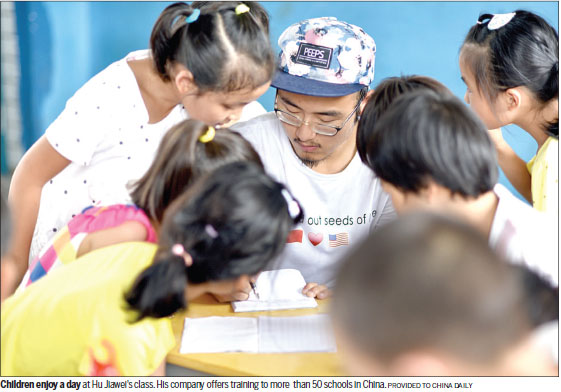University makerspace supports start-up culture

Hu Jiawei, a 22-year-old college student from Jiangnan University, has a busy summer break. He is the founder and CEO of his social enterprise that provides training and materials for sex education for children to teachers and parents.
Hu and his team have travelled to several cities to join start-up expos, deliver training sessions to school teachers and meet parents at lectures and forums.
When he returns to the company's office at the university's makerspace, he sees new maker peers are moving in. Some that have been successfully incubated at the space are establishing their own entities outside the campus now.
University makerspace supports start-up culture
In the 98-square-meter room shared with other three start-ups, Hu established his social enterprise Bao Hu Doudou Technology Ltd in 2014 as a sophomore.

Now the enterprise has provided training to more than 50 schools, and has developed teaching materials, an online cuerrirculm and reading materials for children.
The rental for Hu's enterprise is about 500 yuan a month , which is about 20 percent of the market price, as one of the privileges that the makerspace offers to start-ups.
Makers also have easy access to display rooms in order to showcase their products and services.
University makerspace supports start-up culture
They can use the cafe-meeting room for business talks and presentations, and join lectures and training delivered by the on-hand experts.
This team of experts helps makers to identify their business model and tackle technical problems before they can finally become established enterprises and successfully incubated.
"One of the best parts of working here in the makerspace is that you learn from your peers and get resources that help you to get your project widely known. The support is far more than just financial. It is all-faceted and empower start-ups to become sustainable, like raising up toddlers so they can walk by themselves in the future," says Hu.
The makerspace at Jiangnan University is one of the hundreds of incubators in Wuxi. The city's municipal government has employed significant resources and launched a series of policies to encourage college students, graduates and researchers to start companies and strive for innovation, as the city aspires to become an innovation hub.

For example, at Wuxi New District (formerly known as Wuxi National Hi-tech Industry), start-up projects can apply for local government funding when they have secured initial "angel" investment.
The size of financial support from local government fund could be similar to that of the angel investment, and the fund will exit when the projects have secured their next round of funding. In Wuxi, support for mass entrepreneurship and innovation must be efficient because only in this way can it be sustainable, said Yin Xueyan, National University Science Park of Jiangnan University .
"There are a lot of competitions, roadshows and exhibitions that start-ups can join in Wuxi to promote themselves, and only the excellent ones which have survived rounds of screening are chosen to be incubated. Support, be it financial or not, must be allocated to the best projects, those which are likely to be successful and create value for society, such as offering employment opportunities. Cheap funding will only lead to insufficiency and lower quality.
At makerspace, about 70 percent of projects are successfully incubated, which is a relatively high figure," said Yin.
wuyiyao@chinadaily.com.cn

(China Daily USA 09/16/2016 page9)
Today's Top News
- Researchers conclude Antarctic sea survey
- Trump signs order for a global 10-percent tariff
- Orders for robots surge after Spring Festival Gala
- Technology transforming creativity
- Iran to prepare draft of possible nuclear deal with US in 2-3 days: FM
- 7 Chinese tourists drowned after vehicle sinks in Russia's Lake Baikal






























